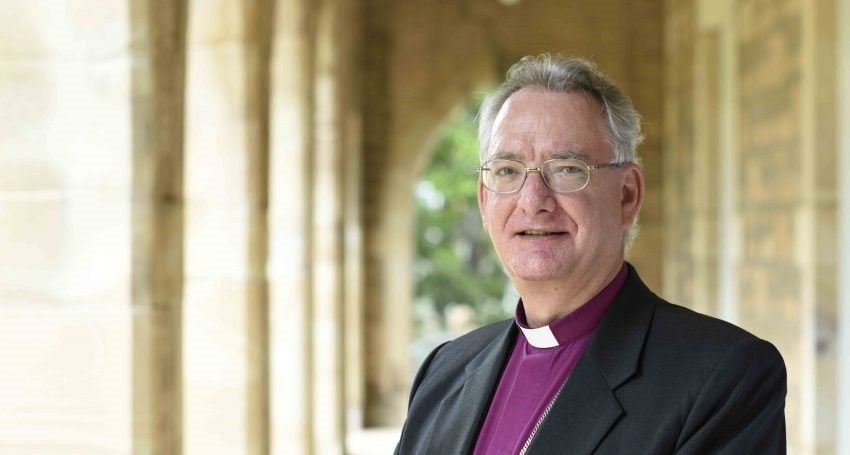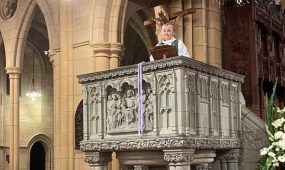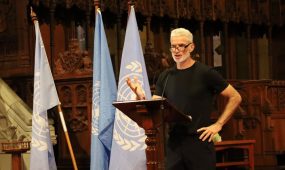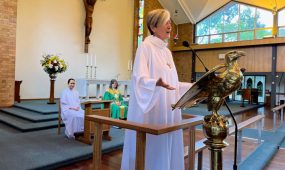Putting on Christ
Homilies & Addresses
“Every person who is baptised promises, or in the case of young children godparents promise on their behalf, to turn to Christ. They are signed with the sign of the cross to show that they are marked as Christ’s own forever. And they are called to Christian ministry, to serve Christ in the world,” says Archbishop Phillip Aspinall

Every person who is baptised promises, or in the case of young children godparents promise on their behalf, to turn to Christ. They are signed with the sign of the cross to show that they are marked as Christ’s own forever. And they are called to Christian ministry, to serve Christ in the world. And when people are confirmed they renew these promises for themselves and seek the strengthening of the Holy Spirit to live that life.
And we usually think of life of Christian ministry in terms of the jobs that people do, the tasks they take on in Christ’s name, the work they will do in the world to serve Christ’s cause.
There is a problem with that way of thinking about Christian ministry, though. The problem is that it basically rules out little children, old people, those with no leisure, the poor, and the sick. All these people lack at least either the skill, the energy, the time, the money or the good health to take on significant jobs. So if that’s what ministry is then they can’t be ministers, so why baptise or confirm them?
I once baptised and confirmed an 87-year-old lady. She wasn’t very mobile. She couldn’t go anywhere much. We had the service in her little unit. She could hardly see anything. She could hear very little and her hands were so screwed up with arthritis and gout that she had difficulty handling things. What significant jobs could she take on in the life of the Church or in the community? So if ministry is to do with the jobs or tasks people do, why baptise and confirm such a person?
Advertisement
But what if ministry isn’t to do with jobs done? There’s another way of thinking about baptism and confirmation.
St Paul talked about putting on Christ like a garment – “All of you who were baptised into Christ have clothed yourselves with Christ” (Galatians 3.27) – which is where the custom of having baptism or Christening robes comes from. When we say “I turn to Christ” we are taking on the character of Christ, becoming Christlike, committing ourselves to grow into the likeness of Christ, in the power of the Holy Spirit, so that when people see us they see the character of Christ.
What if ministry has more to do with the character of a person than with the jobs a person does? Then it would be possible for all the baptised.
What if Christian vocation is to do with being infused with the character of Christ? What might it look like then? What are the character traits of the Christian?
One is humour. Humour was definitely a mark of Jesus’ life. We catch glimpses of Jesus’ humour in the New Testament. Andrew calls his brother Simon and introduces him to Jesus. Simon will be called Peter and he will be that famous bombastic, mercurial character who seems to rush in like a bull-at-a-gate and is up and down all over the place. He’s the first to call Jesus “Messiah”, and then in the next breath reveals he doesn’t understand what that means. He announces confidently that he will follow Jesus anywhere, and then betrays him. After Jesus’ death he returns to fishing but then becomes one of the most energetic apostles. Jesus playfully, humorously affirms this mercurial, changeable Simon bar Jona. He gives him a funny nickname. Simon shall be called Cephas, says Jesus. Rock or as we would say Rocky – even though Simon was anything but rocklike, solid, dependable, unshakeable. And bar Jona means son of Jona, that is son of John, or as we would say Johnson. So the first Pope’s name was Rocky Johnson! With humour Jesus gently affirms this impetuous character and paradoxically indicates that on such a shaky foundation the Church will stand firm.
Advertisement
Jesus’ humour was not always gentle and affirming though. At times it could be quite cutting. He told the pharisees that they strained out gnats but swallowed camels. He called them white-washed tombs: on the outside looking clean and respectable but inside full of putrid flesh and dead bones. He cut away self-righteousness through humour and ridicule. Jesus’ humour was directed towards bursting the bubble of pretence and self-importance and allowing the universal human predicament to be recognised, the basic commonality of human life. His humour gave birth to solidarity. Humour is a character trait of the baptised.
A second one is Hospitality. Christians are to be hospitable people. The word comes from the same root as the word “hostile”, and that’s the clue to what it means. Hospitality is to do with welcoming an enemy as a guest. And enemies can be all kinds of things, not simply people. Welcoming the enemy as guest – reaching across barriers of fear and mistrust. Creating friendships, new communities of belonging and trust in place of scepticism and segregation. We’re no longer talking about true hospitality when we reduce it to social niceness with the like-minded. Hospitality is a character trait of Christ.
Another is Compassion. Compassion means to suffer with. A small child was born with a deformed foot and as a result was over-protected by his well-meaning parents. Eventually the day came when the parents let the boy go down the street to the shop on his own for the first time. The shop was only just out of sight so the panicking parents stood anxiously by the gate watching for the boy’s return. They waited and waited and he didn’t come. The panic rose and they ran along the street looking for him. Not far from the shop they eventually saw him coming along the footpath, slowly, dragging his foot along. Almost in tears, the mother burst out, “Where’ve you been?” “I saw Jane,” he said. “She dropped her doll and it broke.” And his father babbled on, “And you had to stay to help her pick it up.” “No,” said the boy. “I had to stay to help her cry.” To be able to suffer with someone. Perhaps we’ve made too much of helping people, which can make them dependent on us so we can help them some more. Suffering with.
Confrontation is a character trait of Christ and the Christian. Confrontation is really offering an alternative to the way things are. Desmond Tutu was once asked how he came to live his life the way he did. He said that as a young boy he had once seen a white man tip his hat to a black woman. That white man was Trevor Huddleston, an Anglican priest, later to become a bishop, and the black woman was Tutu’s mother. In that simple gesture Tutu saw a whole world of meaning. In fact he saw the possibility of a whole new world for South Africa and he gave his life to making real that alternative vision. From that simple gesture his whole vocation unfolded. Confrontation is offering an alternative to the way things are. It’s a character trait of Christ and all the baptised.
Gratitude and generosity are Christian character traits. In George Eliot’s novel Silas Marner, there’s a weaver whose whole life is devoted to work. He weaves from daylight to dark to earn more and more gold, which he’s dead scared will be taken from him so he hoards it under his floorboards. One day his gold is stolen and his whole world falls apart. He suddenly loses all desire for gold. Eliot writes:
“The disposition to hoard had been utterly crushed at the very first by the loss of his long–stored gold: the coins he earned afterwards seemed as irrelevant as stones brought to complete a house suddenly buried by an earthquake; the sense of bereavement was too heavy upon him for the old thrill of satisfaction to arise again at the touch of the newly–earned coin.”
Remarkably though his life and world are amazingly remade when he meets a little girl whose mother has died and for whom the weaver becomes responsible:
“And now something had come to replace his hoard which gave a growing purpose to the earnings, drawing his hope and joy continually onward beyond the money.
In old days there were angels who came and took men by the hand and led them away from the city of destruction. We see no white–winged angels now. But yet men are led away from threatening destruction: a hand is put into theirs, which leads them forth gently towards a calm and bright land, so that they look no more backward; and the hand may be a little child’s.”
The weaver’s life is now focused on doing all he can for the girl. Fear and selfishness are replaced by gratitude and generosity. They are character traits of Christ. And, by the way, they are the foundation of the Christian discipline of stewardship to which every baptised person is called. When we are put in touch with God’s love and generosity to us, that turns into gratitude which overflows in generosity to others. They are Christian character traits.
All who are baptised and confirmed are called to take on the character of Christ, to be the presence of Christ, in the world. It doesn’t matter whether we’re child or adult, sick or well, rich or poor, wise or simple, strong or weak.
In baptism we are incorporated into Christ’s body, we put on Christ so we might be infused with Christ’s character, so that we might be Christ’s presence in the world.
In confirmation we are strengthened by the Holy Spirit, Christ’s Spirit, so that the character of Christ might shine more strongly in us.
In the eucharist we feed on the body and blood of Christ so that we might live in him and that his life might live in us. The eucharist re-constitutes us as his body; we are re-infused with his character and sent out to be his presence.
This is the basic ministry we all share.
We have one purpose in mind: to be Christ’s healing, reconciling presence in the world so that all people may be restored to unity with God and with each other in him.
We have been called by God so to live that everyone else will discover what is already true for them also; what God has done for them, too, in Christ.
The one test of all we are and all we do is this: In what ways are the lives of people around us who don’t come to church different because we do? Are people being reconciled to God and to each other in Christ?
May we all be so strengthened by Christ’s Spirit that we may be his presence that this unity might be real.
Sermon given by Archbishop Phillip Aspinall AC on Sunday 28 November 2021 at St Luke’s, Ekibin. Published by request.






